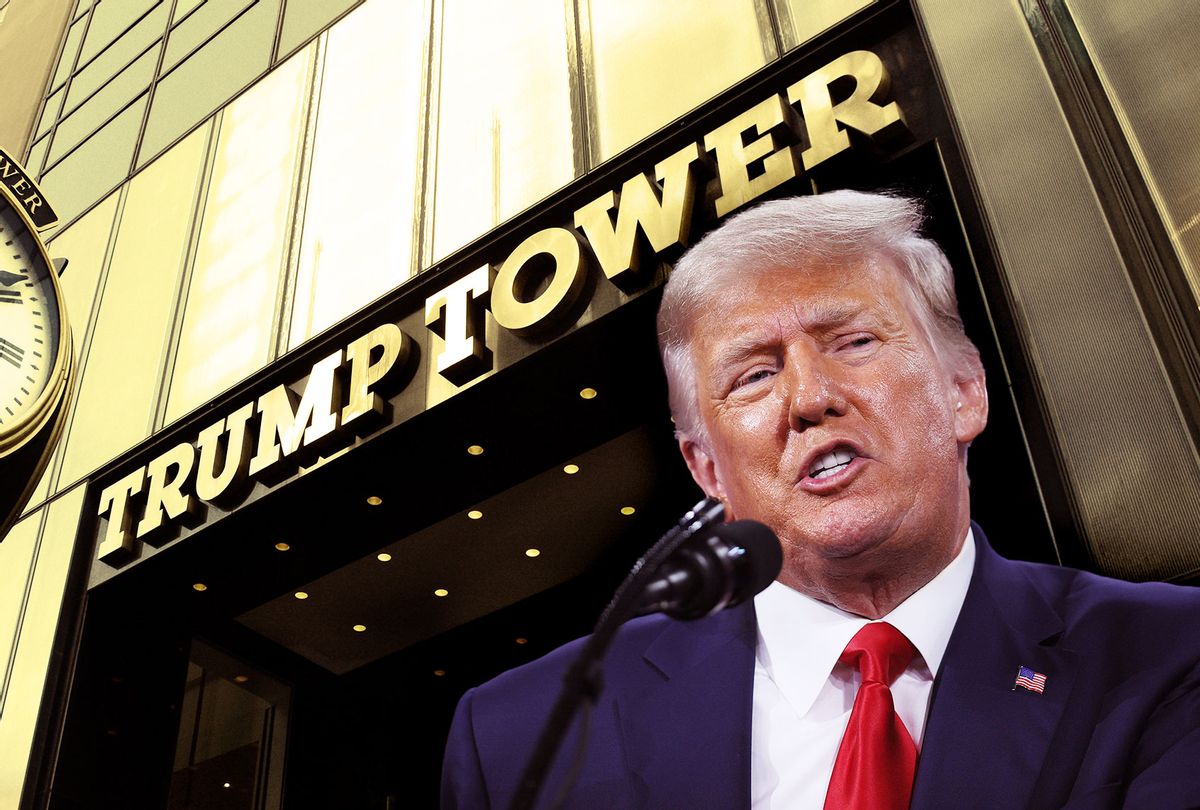Former President Donald Trump appeared to confirm that the property valuations that his company submitted to banks and insurers were meant to "induce" loans from lenders while being questioned by prosecutors from the New York attorney general's office, legal experts say.
Counsel for the New York attorney general's office on Monday showed Trump a Deutsche Bank term loan agreement from the early 2010s that Trump had verified and signed. The prosecutor then asked Trump if the intentions to submit values of businesses and the properties of the Trump Organization were "in order to induce lending," Inner City Press' Matt Russell reported.
"You see that?" the prosecutor asked Trump while pointing out the language on the document.
"Yes," the former president answered.
The prosecutor asked Trump if he believed the document was "true and accurate," and Trump responded, "Yeah, I do."
The admission set legal experts ablaze online with many pointing out how critical it is to the attorney general's $250 million lawsuit against Trump.
MSNBC legal analyst Katie Phang called the exchange a "CRITICAL admission by Trump as he admits that the INTENT in making these financial representations was to convince lenders to loan money."
"BREAKING: AG GETS TRUMP TO AGREE THAT THE FINANCIAL STATEMENTS AND TRUMP'S PERSONAL GUARANTY WERE TO INDUCE BANKS TO LEND MONEY," New York University Law Prof. Andrew Weissmann wrote in all caps on X, formerly Twitter. "KEY FACT FOR THIS FRAUD CASE."
Trump's testimony also helped Attorney General Letitia James "score points" in several instances, MSNBC legal analyst Lisa Rubin reported.
Dubbing it a "rollercoaster of a day," Rubin said that the former president's testimony demonstrated "that despite having no memory of telling a Wall Street Journal reporter that a particular building was valued at $600 million, a contemporaneous email from his son showed he, in fact, did exactly that.”
In another instance, Rubin reported that James' team “has shown that despite much lower, and sometimes even negative net revenue from leasing that same building, Trump told a Forbes reporter — on tape — that that building ‘threw off’ between $50-60 million per year, another conversation Trump did not recall.”
Rubin added that the former president's testimony also showed that financial statements from nearly a decade ago valued his Aberdeen property in Scotland "as if he could sell thousands of homes tomorrow," when he admitted that he has only used the property to build a second golf course and held onto the 1,000 acres where those residences were supposed to be built.
"And perhaps most damning of all,” Rubin concluded, “they exposed that despite signing promises to the Town of Palm Beach and the National Trust for Historic Preservation that he would never use or develop Mar-a-Lago as anything but a private membership club, Trump valued Mar-a-Lago on his financial statements as a private residence, as if those contractual agreements were as disposable as Kleenex.”
We need your help to stay independent
Trump also acknowledged that he'd influenced the valuation of several of his properties on the witness stand Monday, responding, "Yes, on occasion. Both high and low" to a prosecutor's question about whether he ever thought the values were off in his statement of financial condition, HuffPost reported.
When asked specifically about a 2017 statement pertaining to the value of his Trump Tower penthouse in Manhattan, the former president said it "probably" came at his direction.
“Probably, I said I thought it was too high,” Trump said. “I don’t know what’s too high anymore, because I’m seeing things sold at numbers that are very high.”
In earlier financial statements, the former president falsely claimed the apartment was more than 30,000 square feet, a size that was nearly three times as large as the actual square footage. That claim fell apart after a Forbes magazine investigation found that the property amounted to less than 11,000 square feet.
In a separate line of questioning, Trump also distanced himself from a 2021 financial statement on the grounds that he was busy in the White House "keeping our country safe" from China and Russia.
“Just for the record,” Wallace responded, “you weren’t president in 2021?”
“No, I wasn’t,” Trump replied.
Want a daily wrap-up of all the news and commentary Salon has to offer? Subscribe to our morning newsletter, Crash Course.
The value of Trump's various real estate holdings is the focus of the case against him. Trump Organization executives, including the former president's two eldest sons, testified last week and also largely distanced themselves from the statements of financial condition and blamed the accounting firm in charge of creating them.
Trump has also repeatedly claimed that a disclaimer clause on the statements shields him from any responsibility. The clause says “don’t believe the statement, go and do your own work,” Trump claimed in an earlier deposition. “The statement is worthless. It means nothing.”
But presiding Judge Arthur Engoron, who repeatedly asked the defense attorneys to get Trump under control as he rambled through questions and attacked him and the attorney general, disagreed.
“The clause does not use the words ‘worthless’ or ‘useless’ or ‘ignore’ or any similar words,” Engoron wrote. “It does not say ‘The values herein are what I think the properties will be worth in 10 or more years.’”
Read more
about Trump's testimony
- "Astonishing": Experts say Trump meltdown shows why lawyers won't let him testify at criminal trials
- Trump “just yelled at the judge” for several minutes — and has been “screaming insults” at NY AG
- "Doesn't know how to act in front of a judge": Legal experts school Trump lawyer over meltdown
- "Control your client": Judge calls out Trump lawyers and threatens to shut down testimony
- Michael Cohen: Trump will go broke and may face prison — "it's going to hit him hard"



Shares